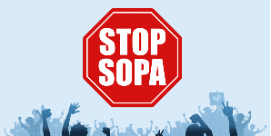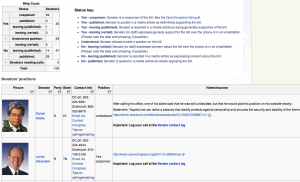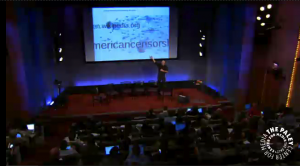
Prof. Yochai Benkler presents "Blueprint for a Networked Public Sphere" at Activate NYC Summit, May 3rd
This video presentation, by Prof. Yochai Benkler of Harvard’s Berkman Center for Internet & Society, is one of the best articulations I’ve ever seen of the meaning of “participatory politics”.
Please watch it in full & share it: Blueprint for Democratic Participation.
(We’d embed it here for handiness, but alas, no such sharing enabled by the host site, unless you subscribe for a membership, but that’s all right. We’ll be talking about this extensively & excitedly in the months to come.)
Prof. Benkler gave the speech last week Thursday, May 3rd, at the Guardian US Activate NYC Summit. (Great lineup of heavy-hitter thought leaders, compliments to Guardian US team & their Open Editor, Amanda Michel.) The presentation builds on his ongoing academic research into the stop- #SOPA movement for #netfreedom that peaked last fall through Jan.-Feb. 2012, and is ongoing. Which in turn, builds on his ‘alpha’ version of the speech from the Truthiness conference in March 2012 at Harvard, link to YT video, which mentions OpenCongress’ role in the netroots advocacy at approx. 12:52 in.
More background info on why this is so important to us – on Feb. 8th, Donny & I wrote this recap for the OC Blog of what happened in and around American Censorship Day, Jan. 18th, the biggest-ever day of traffic & engagement on OpenCongress to protest #SOPA. Very proud to be part of the defenders of the open Web.
Back to the above-linked Yochai video – absolutely vital to watch in its entirety – I was fortunate enough to attend the Guardian conference and was overwhelmed with how sweepingly & compellingly this talk captures our organization’s mission. It’s a highly-practical empirical case study of how the open Web & p2p networks can “filter up” the most useful & current info, instantiating the public interest through the semi-coordinated actions of a variety of entities, from non-profits to tech watchdogs to mass-market web services. Of course I can’t speak officially for his timeline, but Prof. Benkler said he’s continuing to iterate his lecture, so final version to-come in a couple months. (Disclosure – Yochai is on the advisory council of the non-profit Sunlight Foundation, the founding & primary supporter of OpenCongress since we launched in 2007.  But Yochai has no affiliation with our non-profit, the Participatory Politics Foundation, we’re just friendly & supportive & have admired his work since his book The Wealth of Networks in ’06.)
After a brief intro ad on the Fora video service, Prof. Benkler’s presentation is about 15 min. long, with OpenCongress appearing as a leading resource for understanding the legislation itself, social wisdom around it, and an open hub for activism about 5 min. in. The video also highlights, with significant focus & weight, the positive role in encouraging netroots activism from our sibling 501c4 non-profit organization, Fight For the Future, working to defend online freedom in coalition with American Censorship (of which PPF was a founding member) & the brand-new Internet Defense League (count PPF in as well, of course).
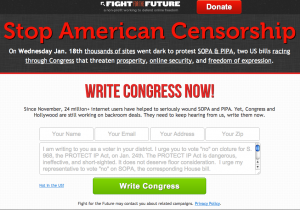
Homepage for American Censorship coalition to stop-SOPA & defend net freedom, from PPF's sibling non-profit, Fight For the Future
Don’t miss the arc of the presentation and its findings on “information backbones” (fact-checking false memes & filtering-up #realitybased discourse fluidly) – so please watch the whole thing & embrace (not uncritically, but hopefully) the future of the open Web as the greatest-yet communication medium between humans for community organizing & democratic participation (if we can retain a foundation of net neutrality & mitigate corporate gatekeeper influence & commercial oligarchical erosion) – but allow me to loosely transcribe Prof. Benkler’s summarizing conclusion, if he doesn’t mind ::
The networked public sphere is composed of layers. There are the traditional media organizations and they continue to play a role, but interestingly, in this dimension they are not in a privileged position. They are complemented by blogs that allow particularly engaged & knowledgeable individuals… to play substantial roles. We see the tech media, not at all political, playing a critical role. We see traditional NGOs also playing a large role as info brokers & sources of education, and amazingly enough, over 3 dozen special purpose action sites that are set up specifically to find a way to block the legislation… one or two of them stick, and they move forward, and they stop this piece of legislation.
Together creating a tapestry that is in fact the nature of the networked public sphere. No  not everyone is a pamphleteer, but we’re also not falling off a cliff. What you see is a complex relationship between NGOS & commercial organizations, between V.C.’s & activists, b/w traditional media & online media, between political media left & right and tech media, all weaving together a model of actually looking, learning, mobilizing for action, and blocking [SOPA]. This, ideally, is the shape of the networked public sphere. – Prof. Yochai Benkler
My hope & expectation is that Prof. Benkler’s latest speech on networked activism will become as influential & central to the #nonprofit, #publicbenefit, #opengov movement as Prof. Larry Lessig’s seminal lectures on systemic corruption. (Not to mention other #opengov legal-academic open-tech thought leaders like Profs. Susan Crawford, Beth Noveck, and many more.) I am optimistic that, as the implications of the stop-SOPA movement sink in further and as our #opengov movement matures to fight the #systemiccorruption of the federal legislative process, PPF will find additional not-for-profit funding support to enhance our free & open-source online organizing features.  Please read & circulate our non-profit funding prospectus – support our public-interest work. My compliments to Prof. Benkler for his thoughtful research. we’re thrilled to be a part of it and hope to contribute analytics & #opendata & open-source code from OC however helpful.
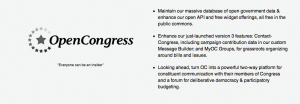
Where we're headed with OpenCongress as a free engagement tool - help us grow! Open-source & not-for-profit.
To reiterate, Prof. Benkler’s vision is absolutely core to PPF’s founding premise – that the open Web can & will generate networks for peer-to-peer watchdogging of our elected officials, mitigating systemic corruption in government and improving political outcomes for the public benefit. For example, the free OCv3 online organizing features we released last summer can help groups engage with the bills & issues they’re tracking at the federal level. Our proposals to turn OpenCongress into a two-way platform for continual, reciprocal communication with elected officials will result in a more deliberative & participatory democracy. (More to come on the real-world distinctions, as we see them from a tech-booster perspective, on representative vs. parliamentary vs. participatory vs. direct vs. deliberative democracy – and indeed, participatory politics more broadly as we foresee it.) More practically, with more support we can turn OpenCongress into a more powerful open platform for advocacy at the community level in Congressional districts. (And at the state & local levels, our next major project, OpenGovernment, seeks to replicate the OC model of transparency & free engagement tools.) We’ve written before on the OC Blog about how this model of D.C. based public-interest legislative / policy experts (e.g. our allies Public Knowledge, EFF, Free Press & others) combined with tech-media press (e.g. TechDirt) and vital online communities (e.g. Reddit’s new “Watching Congress” subreddit) will result in ever-more meaningful accountability in the legislative process. It won’t necessarily reform the system immediately, but as we saw with SOPA, we were able to come together to stop the worst internet legislation in history. But we’re fighting for comprehensive reforms towards a fundamentally more participatory democratic system in which we don’t have to be starting from such an uninformed, closed-off position in crafting legislation.
This January, our successful wiki community project to stop SOPA & PIPA proves the public demand & general use case for our proposed new features on OpenCongress to “whip Congress”, for which we seek non-profit funding support for open-source Web development. Each of these major bills & issue areas in Congress can be subject to many overlapping stop-SOPA-style grassroots campaigns – whether it’s catastrophic climate degradation or immigration reform or freedom of association or reproductive rights or civil liberties or net neutrality or economic inequality or electoral reform – with a bit more funding to develop campaign features on OpenCongress. Major donors & philanthropists, please contact me anytime to hear more about our plans for enabling SOPA-esque campaigns for public accountability, we need your help to build them out and offer them to the public on the open Web: david at ppolitics dot org. Help us facilitate more stop-SOPA-style engagement on OpenCongress – around the economy, education, health care, and any issue imaginable.
The Guardian summarizes in their blog-style write-up: “Yochai Benkler, co-director of Harvard University’s Berkman Center for Internet and Society, followed with a detailed analysis of the SOPA/PIPA debate and how the way internet users altered the decision making process offers “a unique insight into the dynamics of what the future of democratic participation could become”.
(Screenshot of photo above from Fora.tv video for the Guardian US Activate summit.)
